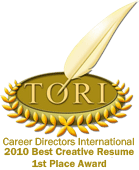THE question.
Everyone has at least one. THE question you don’t want to answer in an interview.
- Why do you have a two-year work gap?
- How do your skills in technology management translate to business development?
- Why have you had four jobs in two years?
- Why did you leave your last position?
You spend hours crafting your resume or hire a professional resume writer to help you fill the two-year gap, translate your transferrable skills, develop value statements for short-term jobs, and think of ways to say you hated your boss.
Still, somehow, the interviewers know the very question you don’t want to hear.
You can stop worrying and get to work on your answer. Here are the steps for scripting answers that are accurate, satisfying for the interviewer, and forward-looking.
Scenario
Let’s say the question you don’t want asked is, “Why do you have a two-year work gap on your resume?” The reason is that you cared for your father full time during the last two years of his terminal illness. (Frankly, the first thing I would do is put it on your resume, but I see a lot of gaps, so that answer is for another blog post.)
The job you are interviewing for is a project management position with a technology firm.
Steps
1. Concerns: Identify and list your concerns for interviewing. What questions don’t you want to answer? What do you worry about when you think of interviewing? What do you have trouble putting into words? Is there a part of your work history that you have difficulty explaining? Have you had negative interview experiences?
2. Value: List the three most valuable assets you bring to your future employer. These might include excellent closing ratio, history of management success with teams of 20 or more, or award-winning illustrations and graphic art design.
3. Answer: Write your answer to the question you fear: “I cared for my father during the last two years of his terminal cancer.” Then, turn the conversation to an asset: “While I found that time extremely challenging and rewarding, I used the time when he slept to complete the training you require in project management. With my PMP and my background in software development, I should be an asset to the team on Day 1.”
You don’t have to belabor the point that you didn’t work in your field for two years. You do need to convey that you kept current in your field and progressed your training during a very difficult time in your life, admirable accomplishments.
4. Practice: Now that you have scripted your answer, you need to be comfortable and familiar with it. DO NOT MEMORIZE YOUR ANSWER. Interviewers can spot memorized answers a mile away, and they don’t respond well. Your anxiety comes across, and they feel uncomfortable. Picture using memorized answers during a conversation on a first date. Awk-ward.
Instead, practice saying your answer in your own words. Then, practice in front of a mirror. Next, ask your spouse, roommate, or trusted friend to practice the question and answer with you. Get comfortable with the concept and meaning of the question and answer, not just the words. When you can answer comfortably and confidently, you are ready for your interview.
If you have trouble figuring out the questions that are getting in your way or the answers that will work for you AND the hiring manager, contact me today.









